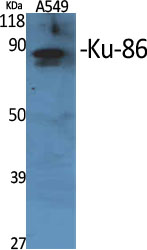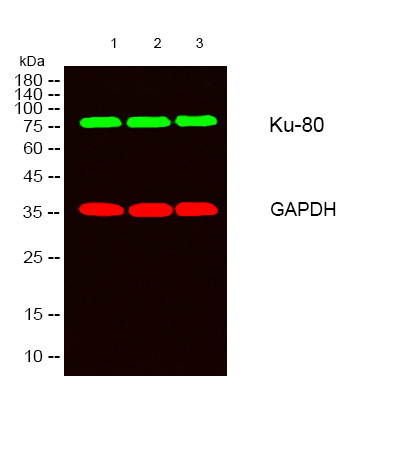IRE1 Phospho thr973 rabbit pAb
- Catalog No.:YP1798
- Applications:WB
- Reactivity:Human;Mouse;Rat
- Target:
- IRE1α
- Fields:
- >>Autophagy - animal;>>Protein processing in endoplasmic reticulum;>>Apoptosis;>>Non-alcoholic fatty liver disease;>>Alzheimer disease;>>Parkinson disease;>>Amyotrophic lateral sclerosis;>>Huntington disease;>>Spinocerebellar ataxia;>>Pathways of neurodegeneration - multiple diseases;>>Lipid and atherosclerosis
- Gene Name:
- ERN1 IRE1
- Protein Name:
- IRE1 thr973
- Human Gene Id:
- 2081
- Human Swiss Prot No:
- O75460
- Mouse Gene Id:
- 78943
- Mouse Swiss Prot No:
- Q9EQY0
- Immunogen:
- Synthesized peptide derived from human IRE1 thr973
- Specificity:
- This antibody detects endogenous levels of IRE1 thr973 at Human, Mouse,Rat
- Formulation:
- Liquid in PBS containing 50% glycerol, 0.5% BSA and 0.02% sodium azide.
- Source:
- Polyclonal, Rabbit,IgG
- Dilution:
- WB 1:500-2000
- Purification:
- The antibody was affinity-purified from rabbit serum by affinity-chromatography using specific immunogen.
- Concentration:
- 1 mg/ml
- Storage Stability:
- -15°C to -25°C/1 year(Do not lower than -25°C)
- Other Name:
- Serine/threonine-protein kinase/endoribonuclease IRE1 (Endoplasmic reticulum-to-nucleus signaling 1) (Inositol-requiring protein 1) (hIRE1p) (Ire1-alpha) (IRE1a) [Includes: Serine/threonine-protein kinase (EC 2.7.11.1);Endoribonuclease (EC 3.1.26.-)]
- Molecular Weight(Da):
- 107kD
- Background:
- The protein encoded by this gene is the ER to nucleus signalling 1 protein, a human homologue of the yeast Ire1 gene product. This protein possesses intrinsic kinase activity and an endoribonuclease activity and it is important in altering gene expression as a response to endoplasmic reticulum-based stress signals. [provided by RefSeq, Jul 2008],
- Function:
- catalytic activity:ATP + a protein = ADP + a phosphoprotein.,cofactor:Magnesium.,enzyme regulation:The kinase domain is activated by trans-autophosphorylation. Kinase activity is required for activation of the endoribonuclease domain.,function:Senses unfolded proteins in the lumen of the endoplasmic reticulum via its N-terminal domain which leads to enzyme auto-activation. The active endoribonuclease domain splices XBP1 mRNA to generate a new C-terminus, converting it into a potent unfolded-protein response transcriptional activator and triggering growth arrest and apoptosis.,PTM:Autophosphorylated.,similarity:Belongs to the protein kinase superfamily. Ser/Thr protein kinase family.,similarity:Contains 1 KEN domain.,similarity:Contains 1 protein kinase domain.,subunit:Homodimer; disulfide-linked. Dimer formation is driven by hydrophobic interactions within the N-terminal luminal domains
- Subcellular Location:
- Endoplasmic reticulum membrane ; Single-pass type I membrane protein .
- Expression:
- Ubiquitously expressed. High levels observed in pancreatic tissue.
- June 19-2018
- WESTERN IMMUNOBLOTTING PROTOCOL
- June 19-2018
- IMMUNOHISTOCHEMISTRY-PARAFFIN PROTOCOL
- June 19-2018
- IMMUNOFLUORESCENCE PROTOCOL
- September 08-2020
- FLOW-CYTOMEYRT-PROTOCOL
- May 20-2022
- Cell-Based ELISA│解您多样本WB检测之困扰
- July 13-2018
- CELL-BASED-ELISA-PROTOCOL-FOR-ACETYL-PROTEIN
- July 13-2018
- CELL-BASED-ELISA-PROTOCOL-FOR-PHOSPHO-PROTEIN
- July 13-2018
- Antibody-FAQs

